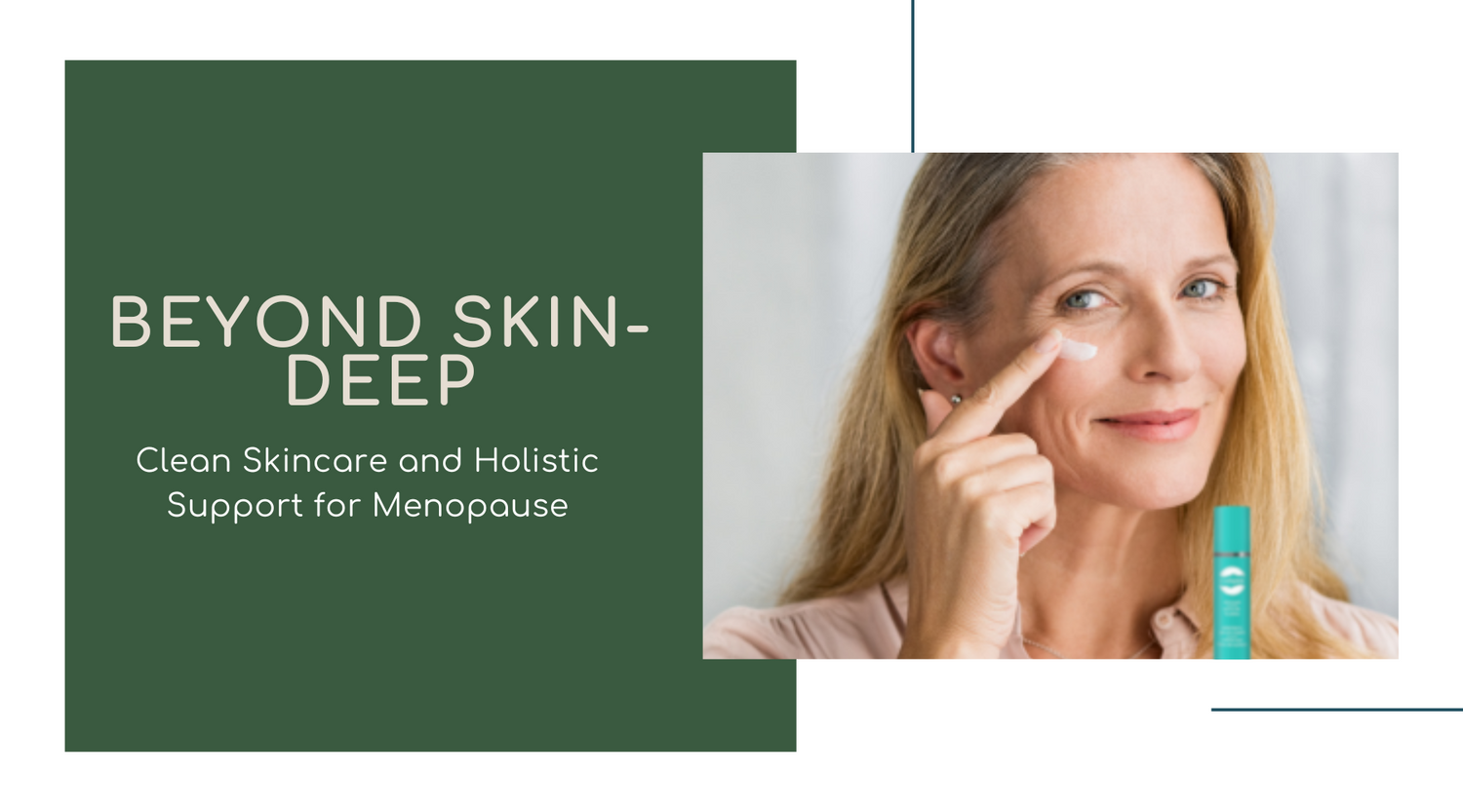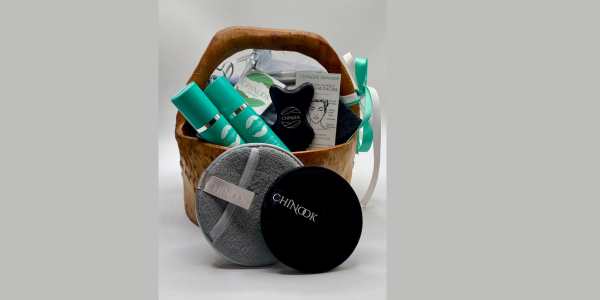
By incorporating gentle yet effective oily skin remedies, such as oil-free cleansers, you can ensure your skin is well-cared for without exacerbating oiliness. In addition to a regular skincare routine, there are various other oily skin solutions that you can incorporate into your daily life.
For instance, using oil-absorbing or mattifying primers before applying makeup can help control shine throughout the day.
Oil-free and non-comedogenic makeup products can also prevent clogged pores and breakouts.
Another natural remedy for oily skin is the use of clay masks. Clay can absorb excess oil and unclog pores, leaving your skin feeling clean and refreshed. Applying a clay mask once or twice a week is a highly recommended remedy for oily skin.
Click here to learn more about the Chinook skincare collection
How to Control Excess Oil on Your Skin
One effective way to manage excess oil on your skin is by incorporating natural remedies specifically designed for oily skin into your skincare routine. Tea tree oil is known for its antibacterial properties and can help regulate oil production.
You can apply a few drops of tea tree oil to your cleanser or moisturizer to control excess oil and prevent breakouts.
Another option is to use witch hazel, which acts as an astringent and helps tighten the skin and minimize oiliness.
Apply witch hazel to a cotton pad and gently swipe it over your face after cleansing. These natural remedies are powerful allies in the fight against excess oil and can lead to a healthier, more balanced complexion.
The Best Skincare Routine for Oily Skin
Caring for oily skin requires specialized attention and a tailored skincare regimen. To maintain a clear and balanced complexion, it is important to cleanse, tone, moisturize, and exfoliate regularly.
Exfoliation gently removes dead skin cells and unclogs pores, which helps minimize oiliness and prevent breakouts.
Including a gentle scrub or chemical exfoliant in your routine two to three times a week can noticeably improve the appearance of oily skin.
Using a clay or charcoal mask once a week can be beneficial to control excess oil and draw out impurities. These masks leave the skin feeling refreshed and revitalized.
Consistency is key in caring for oily skin, so establish a regular skincare routine and stick to it for optimal results.
Caring for Oily Skin
- Regular cleansing, toning, moisturizing, and exfoliating can help maintain a clear and balanced complexion.
- Exfoliation removes dead skin cells and unclogs pores, reducing oiliness and preventing breakouts.
- Including a gentle scrub or chemical exfoliant in your skincare routine two to three times a week can noticeably improve the appearance of oily skin.
- Using a clay or charcoal mask once a week can further control excess oil and draw out impurities, leaving the skin refreshed and revitalized.
Natural Remedies for Oily Skin
Finding natural remedies for oily skin can be a game-changer in your skincare routine, as they can effectively improve your oily skin treatment. Many people face the common concern of oily skin, but with the right approach, you can effectively balance your skin and reduce excess oil production.
You can achieve a healthier and less greasy complexion by incorporating key steps into your daily routine, such as gentle cleansing, regular exfoliation, and using the right moisturizers.
Toners with astringent properties can further aid in maintaining oil control.
Embrace the power of natural remedies and bid farewell to the woes of oily skin.
Understanding Different Types of Oily Skin
Another type of oily skin important to understand is oily and combination skin, which can benefit from specialized oily skin products. This particular skin type is characterized by excess oil production in some areas, such as the T-zone (forehead, nose, and chin). In contrast, other areas may be normal or even dry.
Balancing oily and combination skin can be challenging as it requires different approaches for different areas. Using lightweight, oil-free products on oily areas can help control shine and prevent breakouts. On the other hand, hydrating and nourishing products can benefit dry or normal areas.
By understanding the specific characteristics of oily and combination skin, you can customize your skincare routine and select the appropriate products to effectively manage and maintain a healthy complexion.
Effective Treatments for Excess Oil
One of the best oily skin tips is to choose a product suitable for oily skin and use it 2-3 times a week to maintain a clear complexion. When moisturizing oily skin, choosing lightweight, oil-free formulas that won't clog pores is important.
Look for products that contain ingredients like hyaluronic acid or glycerin, which provide hydration without adding extra oil to the skin.
In addition to using the right products, some natural remedies can help control excess oil. For example, using a clay mask once a week can help absorb excess oil and reduce shine. Try using witch hazel as a toner, as it has astringent properties that can help tighten the skin and minimize oil production.
Another important aspect of managing oily skin is controlling shine throughout the day. Using oil-absorbing sheets or powders can help remove excess oil without compromising the effectiveness of these oily skin tips.
Common Causes of Excess Oil and How to Address Them
Having an oily skin routine can help manage excess oil production, which can be influenced by hormonal imbalances such as PCOS or high levels of androgens. These hormonal fluctuations can cause the sebaceous glands to produce more oil, producing oily skin.
In addition, certain dietary factors can contribute to excess oil production.
Consuming a high intake of sugary or greasy foods can exacerbate oiliness. Therefore, maintaining a balanced diet and incorporating foods rich in antioxidants, such as fruits and vegetables, is essential for promoting skin health and regulating oil production.
By incorporating these factors into a skincare routine, individuals can effectively address excess oil and maintain a balanced complexion.
Tips for Choosing Suitable Products for Excess Oil
When dealing with oily skin problems, finding the right products to manage excess oil can be challenging. Several useful tips can streamline this process.
Selecting products that effectively control oil production while maintaining the skin's natural moisture is crucial.
Look for oil-free or non-comedogenic options that won't clog pores or exacerbate oiliness.
Lightweight formulas are preferable, as they are easily absorbed, unlike heavy creams or oils that can leave your skin feeling greasy. Seek out products that contain mattifying ingredients such as salicylic acid or witch hazel, as these can absorb excess oil and prevent breakouts.
Remember to hydrate your skin with oil-free moisturizers or gel-based formulas. Remember to protect your skin from the sun using an oil-free sunscreen with a high SPF. It's important to note that proper skincare routines and regular cleansing are key to managing oily skin problems.
Daily Habits for Managing Excessive Oil
When dealing with oily skin types, it becomes crucial to adopt daily habits that hold the potential to bring about a significant difference in managing excessive oil. While numerous remedies and products are available in the market, sticking to a consistent routine is crucial.
Let us delve into a few more habits that can assist in achieving a balanced complexion while effectively combating excess oil.
Habits for Managing Oily Skin
- Clean your face twice daily to remove excess oil and impurities.
- Avoid using harsh and abrasive products that can strip away natural oils, as this can lead to increased oil production.
- Use oil-free and non-comedogenic moisturizers to hydrate the skin without clogging the pores.
- Exfoliate the skin once or twice a week to remove dead skin cells and unclog pores, but be gentle to avoid irritation.
Overcoming Excess Oil Problems
Addressing the causes of oily skin can be effectively achieved by incorporating a balanced diet into your daily routine. Consuming foods rich in omega-3 fatty acids, such as salmon or chia seeds, can help regulate oil production and promote healthy skin.
Reducing your intake of refined carbohydrates and sugars can also balance hormone levels and minimize excess oil.
Another important factor to consider is hydration. Drinking adequate water can help flush out toxins and keep your skin hydrated from within. By taking care of your body from the inside out, you can overcome problems with excess oil and achieve a more balanced complexion.
Achieving a Healthy Glow with Excess Oil
When achieving a healthy glow with excess oil, there are various factors to consider beyond a skincare routine and diet, such as understanding the causes of oily skin and finding suitable solutions.
One important aspect to consider is stress management. High-stress levels can trigger oil production in the skin, resulting in a greasy appearance.
Finding healthy outlets for stress, such as exercise or meditation, can help balance oil production and promote a radiant complexion.
Another crucial factor to consider is sleep. Getting enough sleep is crucial for overall skin health. Lack of sleep can disrupt hormone levels and increase oil production, so ensuring a good night's rest can contribute to a healthy glow.
By embracing a proactive approach that addresses internal and external factors, you can achieve a radiant complexion, even if you have oily skin.
Achieving a Healthy Glow with Excess Oil
- Stress can trigger oil production in the skin, leading to a greasy appearance.
- Lack of sleep disrupts hormone levels and increases oil production.
- Engaging in healthy outlets for stress, like exercise or meditation, can help balance oil production and promote a radiant complexion.
- Sleeping is crucial for overall skin health and contributes to a healthy glow.
How to Treat Visible Pores: Effective Solutions for Flawless Skin





